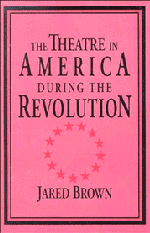Book contents
- Frontmatter
- Contents
- Preface
- Prologue
- SETTING THE STAGE: BEFORE THE REVOLUTION
- SETTING THE STAGE: BRITAIN ASCENDANT
- 5 The Drama of the Revolution
- 6 British Military Theatre, 1778–1779
- 7 British Military Theatre, 1779–1782
- SETTING THE STAGE: AMERICA ASCENDANT
- SETTING THE STAGE: AMERICA TRIUMPHANT
- Epilogue
- Appendix
- Notes
- Bibliography
- Index
7 - British Military Theatre, 1779–1782
Published online by Cambridge University Press: 29 September 2009
- Frontmatter
- Contents
- Preface
- Prologue
- SETTING THE STAGE: BEFORE THE REVOLUTION
- SETTING THE STAGE: BRITAIN ASCENDANT
- 5 The Drama of the Revolution
- 6 British Military Theatre, 1778–1779
- 7 British Military Theatre, 1779–1782
- SETTING THE STAGE: AMERICA ASCENDANT
- SETTING THE STAGE: AMERICA TRIUMPHANT
- Epilogue
- Appendix
- Notes
- Bibliography
- Index
Summary
The british officer corps in New York continued to present plays during the period 1779–82, but it was not the only city in which they were active. Two southern towns, in one of which the British were held captive, joined the roster of municipalities offering theatrical performances during the Revolution.
Staunton, 1779
The account of an unidentified Brunswick officer provides the only available information concerning the theatrical activities of the British military when they were held prisoner in Staunton, Virginia, in 1779. The captive officer, whose account was written on June 1 of that year, described Staunton as a town of “about thirty houses, of which twenty-four are built just like the common houses in Zellerfeld.” Life in captivity was not entirely unpleasant, according to his letter.
A group of English soldiers has put up a Comedy House, where plays are given twice a week, and in which there are already three sets of scenery. On the curtain is painted a harlequin who points with his wooden sword to the words: “Who would have expected this here?” [Seats in the] parquet cost four, [in the] parterre two dollars paper money. The officers lend the actors the necessary articles of clothing; drummers are transformed into queens and beauties. Very good pieces are performed, which, because of their satirical additions, do not always please the Americans, wherefore they are forbidden by their superiors to attend these comedies.
It would be interesting to know just who did attend these comedies, and what the comedies were.
- Type
- Chapter
- Information
- The Theatre in America during the Revolution , pp. 109 - 132Publisher: Cambridge University PressPrint publication year: 1995

